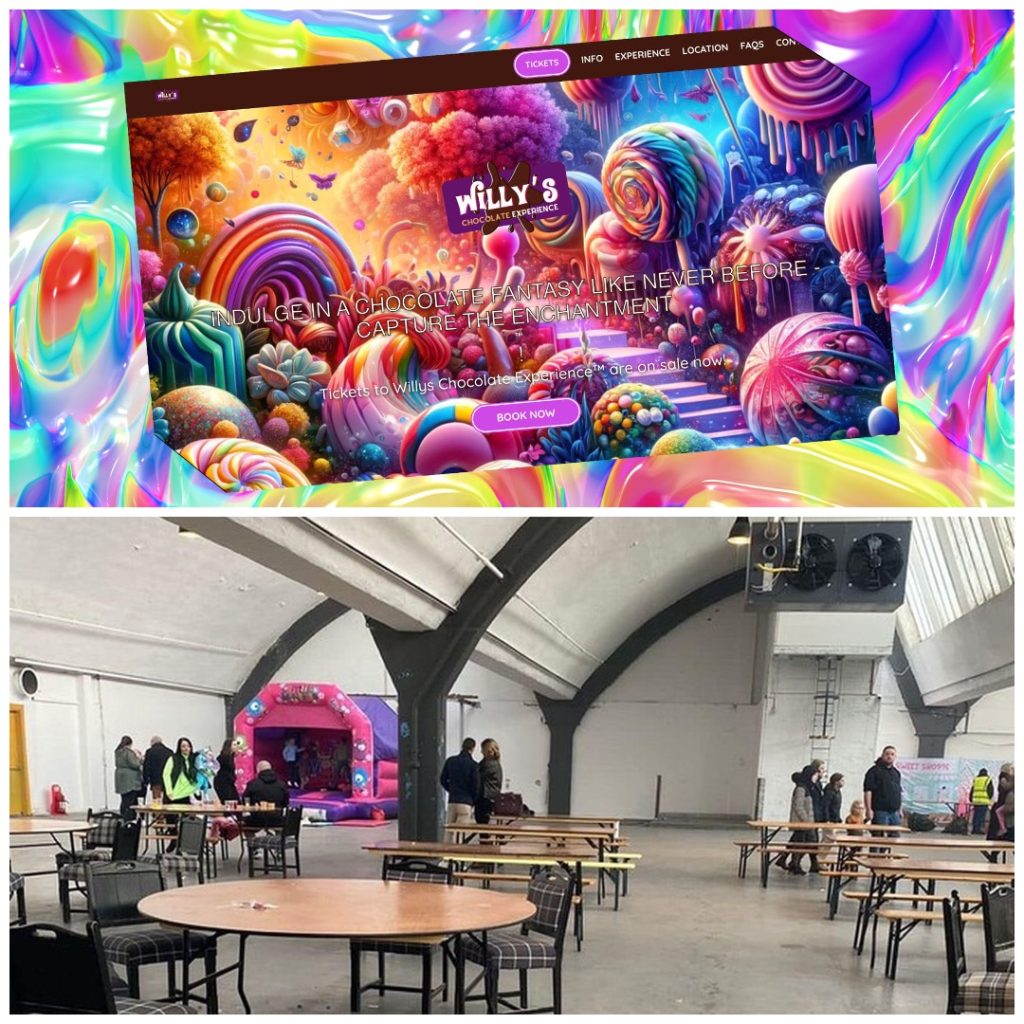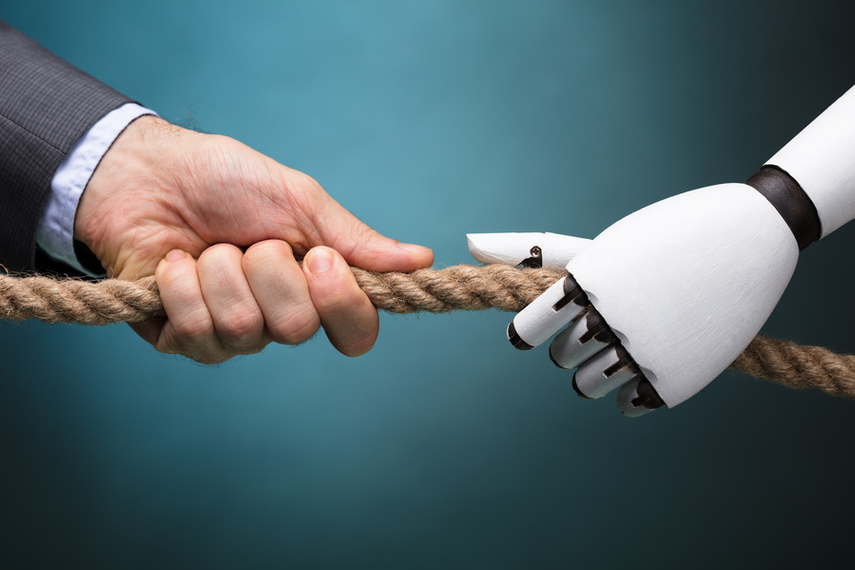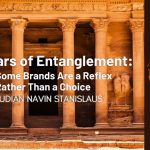By Matthew Keegan
With the hype and excitement of last year’s Gen AI boom now dissipating, Campaign explores why some brands and agencies are adopting a pushback stance when it comes to the new technology in a bid to avoid its pitfalls.
It was advertised to be a fantastical journey into the world of Willy Wonka, one that promised excited kids all the wonder and enchantment of the well-known Roald Dahl story. But in reality, the Willy Wonka Experience held in Glasgow, Scotland, in February this year turned out to be a farce.
On its glitzy website that used AI-generated images and copy, the event was marketed as a “chocolatey bliss” with “whimsical performances,” “Oompa Loompas,” and an adventure with every bite, but it’s safe to say it did not live up to its promise. Upon arrival, children were met with a nearly-empty warehouse adorned with shoddy displays, tacky banners, and plastic props.
The event went viral for all the wrong reasons, and in the words of its organiser, it “ruined his life”. The Willy Wonka Experience that never really was became a modern cautionary tale of the very real dangers involved in relying too much on AI for promotional and advertising purposes.

It’s examples like the Willy Wonka fiasco that are now causing brands and some agencies to pump the brakes on their use of Gen AI as they more carefully consider its place in the marketing mix. “The last year has been filled with examples of AI-generated nonsense that should have never made it past a human filter,” says Alison Ray, general manager at Melbourne creative agency Town Square.
“Why? Because some people, when sold the promise of AI, ceded all control to it, potentially jeopardising their brand’s reputation.” A ‘no AI’ policy? Signs suggest that brands are treading much more carefully, with some demanding stronger AI safeguards in their contracts with some agencies even adopting a strict ‘no AI’ policy in a few cases.
Contracts from Fortune 500 brands are coming with clauses that forbid the use of generative AI in the “creation of campaign deliverables,” Chris Jacks, director of growth strategy at marketing agency HireInfluence told Ad Age. “Recently, we won three new pieces of business and in the [master service agreement] it says, ‘you’re not allowed to use AI of any kind, without prior authorisation,’” said one independent ad agency CEO, who spoke with Ad Age on condition of anonymity to protect the identities of clients.
“So, that even means they don’t want us to use AI to help work on concepts, not just anything that goes out the door.” Meanwhile, skincare brand Dove recently pledged to never use AI in its advertising in place of real models in a bid to keep beauty real and to avoid promoting unrealistic beauty standards.
“Pledging to never use AI in our communications is just one step,” said Alessandro Manfredi, chief marketing officer, Dove, in a press statement. “As we navigate the opportunities and challenges that come with new and emerging technology, we remain committed to protect, celebrate, and champion real beauty.”
But while a growing number of brands are taking a more cautious approach to using AI or banning its usage altogether, it’s creating some tension with agencies, many of whom are racing to adopt generative AI owing to its ability to speed up various processes and save on costs.
“Racing to adopt any new technology without fully understanding how it works, or its potential consequences, should raise everyone’s eyebrows,” says Ray. “Agencies often feel they’re in a race to prove they are on the bleeding edge of technology because there’s a fear that others will get there first. Instead, we should be ‘racing’ to determine how to deploy AI effectively.”
Tug of war between brands and agencies Sebastian Painter-Dodds, AI implementation manager at Icon Agency, says that the current juxtaposition of agencies ramping up their AI knowledge and usage, and then brands clamping it down, is a case for better negotiation.
“With generative AI still in its infancy, brands are likely cautious of the unsafe or unethical use of AI, or worried about getting shortchanged by undisclosed AI usage,” says Painter-Dodds. “The challenge for agencies is finding ways to demonstrate the value of AI to brands, primarily by reassuring them that AI tools are being adopted responsibly while outlining what benefits are being passed on and how.”
Meanwhile, Jessica Thompson, creative director at The Hallway, says that it might be a red herring to talk about agencies as pro-Gen AI and brands as against in such a simplistic way. “Plenty of agency-side individuals, especially creatives, are nervous about the impact AI might have on their roles, their career prospects, the quality of published work, the expectations of their clients, and the general integrity of their practices,” says Thompson.
“Conversely, some brands seem enthused by the relative cost and time savings AI presents throughout production. In my experience, the tension is found less between agencies and brands than it is within the whole proposition of AI itself.” “We all want to create exciting, original, world-leading work, but we all want to do it for less money and in less time,” adds Thompson. “We all believe referencing others’ work is pure due diligence, but we’re worried about how AI is trained using existing work.
We’re all enthusiastic about embracing new technologies and being perceived as cutting-edge, but laud craftsmanship, talent and humanity over all else. I think the tension comes from not knowing what place AI has in our industry yet.”
Can AI ever be a substitute for truth-led ideas?
In a new book ‘Our AI Journey’ by Sam Altman, CEO of OpenAI, the makers of ChatGPT, asserts that artificial general intelligence (AGI) will dramatically transform marketing, with 95% of tasks currently performed by marketing agencies, strategists and creative professionals being handled by AI.
While many in the marketing industry are convinced that AI is just a tool, and not capable of human-level idea creation or creativity, Altman predicts that AGI will be ready within the next five years and will broadly be more capable than humans at a range of different tasks, including campaign ideas and even being able to achieve novel scientific breakthroughs on its own. Sam Altman, CEO of OpenAI, the makers of ChatGPT, predicts that AGI will take over 95% of tasks currently performed by marketing agencies and creative professionals.
Increasingly we are seeing the likes of Meta and Google introducing AI-powered tools that enable advertisers and businesses to create or automate parts or the entirety of their campaigns. But can AI really be a substitute for human creativity and craft? “AI is only as good as the human-generated ideas it’s trained on,” says Ray. “It can’t create something from nothing. It is derivative. But that doesn’t mean AI-led ideas won’t find traction among some brands.
Creativity is hard. It can take time. And as long as there are people willing to sacrifice great for ok if it’s cheaper, there will be a market for AI-led ideas.” Chloe Fair, client services director at Virtue APAC, believes that for work to address human truths and to truly connect with people, there needs to be a human touch.
“Programme a recipe into a robot appliance and it will likely taste different from how your grandma would make the same recipe for this dish,” says Fair. “Processing information to distil truths and create resonating ideas requires a level of perception and judgement that AI hasn’t proven capable of doing to date.”
But, most importantly, Fair adds, AI will never replace the marketer’s gut. “The gut has still proven valuable amid a data-driven world. It would be a challenge for AI to replicate the instinct and intuition marketers have honed from years of experience and learnings from prior campaigns.”
Does AI help or hinder?
By now most of us have seen examples of when AI has been used as a great creative partner or tool alongside the kind of innate empathy, understanding, and creativity that only humans can provide.
We’ve also seen AI’s potential to mislead, replicate human bias and erode consumer trust leading to some unfortunate mishaps. But how can AI be perceived as a tool to elevate great work, rather than something that results in erosion of trust? “Full transparency in the intent and use of Gen AI should help address how consumers react to it,” says Fair. “Although regulation could restrict how fast or sophisticated AI further develops, it seems vital for more rules to be in place such that the use of AI can be perceived as safe, transparent, unbiased and ethically acceptable by the public.”
Meanwhile, Thompson of The Hallway doesn’t agree that it’s necessary to signpost to audiences when AI has been used to create part or all of a piece of work: “If we’re using AI to mislead people—especially into harmful beliefs—then the problem isn’t AI, it’s us. What I think is important is that we all acknowledge and take responsibility for our involvement as human beings in using AI as a tool.
It’s not AI’s fault that it’s prejudiced, it’s ours, and so it’s fully incumbent on us to use it and curate its outputs in a way that doesn’t reinforce those biases.” But Ray of Town Square agency says that what’s ultimately needed is caution.
“The reality is, we’ve all become far too comfortable with the belief we can build the plane while flying it,” she says. For example, ‘move fast and break things’ is an attractive line, until something goes wrong. The question for any brand considering using AI to create work should be: does the reward outweigh the risk? And if something goes wrong, who’s accountable?”
This article was first published on Campaign Asia
MARKETING Magazine is not responsible for the content of external sites.











